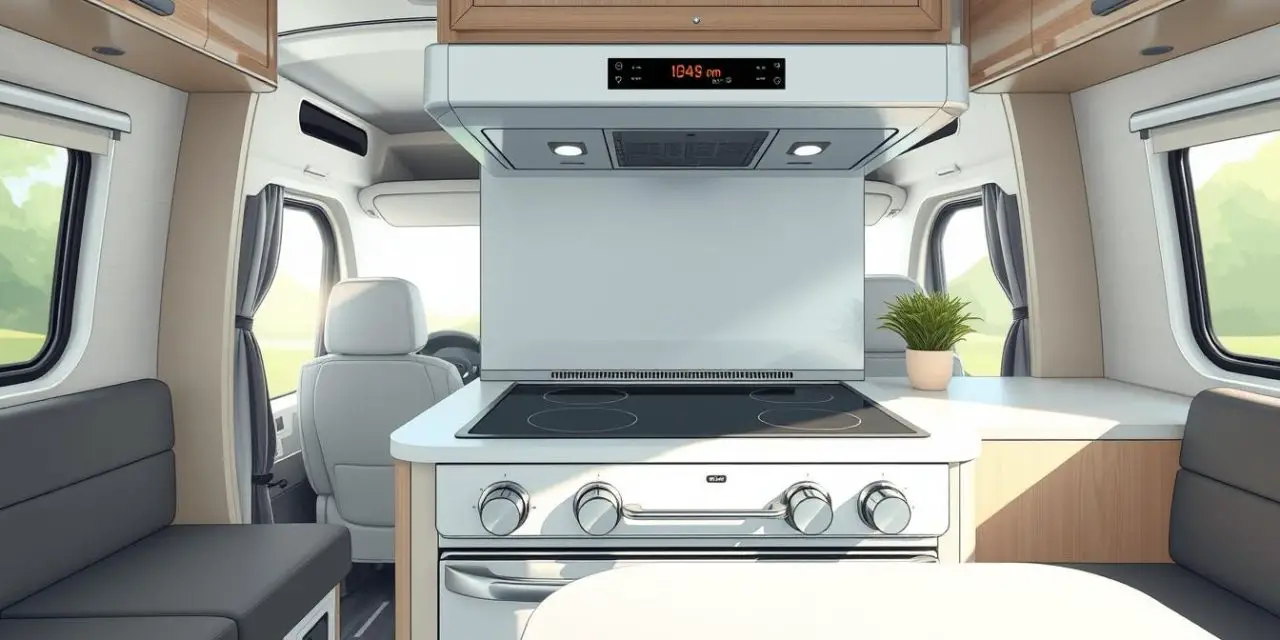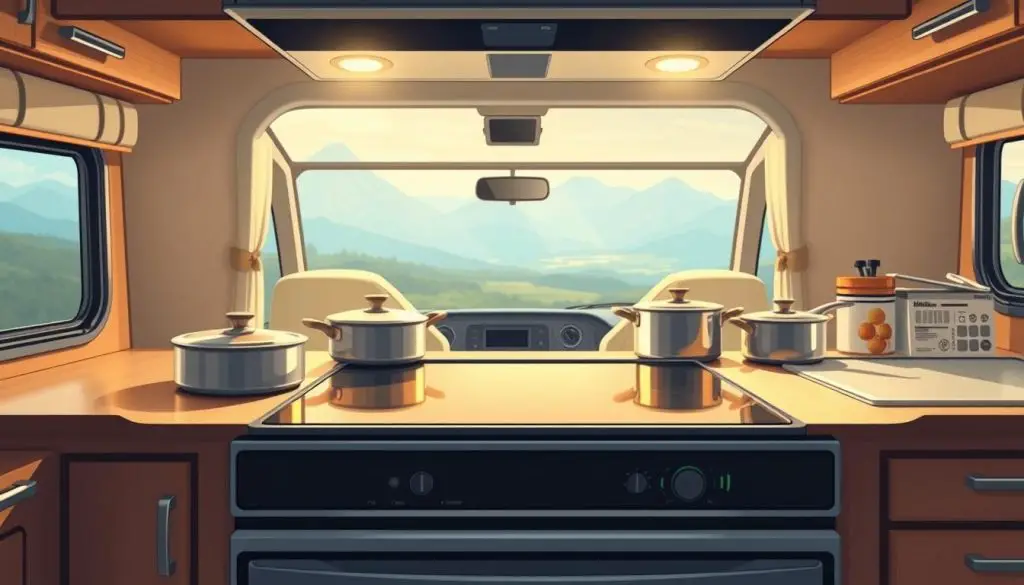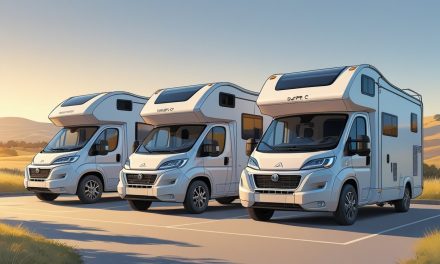The answer is a definitive yes, you absolutely can find an RV equipped with an electric stove. While the vast majority of recreational vehicles roll off the production line with propane cooktops, electric options are increasingly available. Some modern models now include them as built-in features.
This comprehensive guide provides all the essential information needed to navigate your choices. Selecting the right cooking appliance is a crucial decision for your mobile home. It impacts your daily meals, energy usage, and overall comfort during your travels.
We will walk you through the different stove types, safety considerations, and cost factors. Our goal is to help you make the best choice, whether you’re upgrading a current rig or selecting features for a new one. Let’s dive into the details.
Key Takeaways
- Electric stoves are a viable option for RVs, though less common than propane as standard equipment.
- Many newer RV models offer electric cooktops as an optional or standard feature.
- Aftermarket installation is a popular path for adding an electric stove to an existing vehicle.
- The choice between stove types significantly affects your cooking experience and energy consumption.
- This guide covers essential topics like safety, costs, and lifestyle compatibility.
- Making an informed decision requires understanding the pros and cons of each option.
Understanding the Spectrum of RV Stove Options
Choosing the right cooking method involves weighing multiple fuel types and their characteristics. Each option brings unique advantages to your mobile kitchen setup.
Overview of Propane, Electric, Wood, and Diesel Stoves
Propane stoves remain the traditional choice for many recreational vehicles. They operate independently of electrical hookups, making them ideal for off-grid adventures. However, proper handling is essential due to flammability concerns.
Electric models offer modern convenience with stylish designs. They work well at campgrounds with power connections. Wood-burning units provide sustainable heat for environmentally conscious travelers.
Diesel stoves integrate seamlessly with diesel-powered vehicles. They create an efficient single-fuel system for streamlined travel.
Sustainability and Cost Considerations
Each fuel type carries different long-term expenses and environmental impacts. Propane requires regular refills, while electric options tap into campground power.
Wood represents a renewable resource but demands more effort. Diesel offers fuel efficiency but has specific environmental considerations. Your budget and values will guide this decision.
Adapting Stove Options to Your RV Layout
Your vehicle’s available space significantly influences which stove type fits best. Consider ventilation requirements and fuel storage needs during planning.
Smaller rigs might favor compact electric or propane units. Larger vehicles could accommodate wood-burning or diesel systems. There’s no universal solution—your travel style determines the ideal choice.
Can You Get an RV with an Electric Stove? A Buyer’s Guide Perspective
The decision to incorporate electric cooking into your mobile home requires careful assessment of your camping habits. This buyer-focused section helps evaluate whether this option aligns with your travel style.
Assessing Your Power and Cooking Needs
Understanding your rig’s electrical capacity is crucial. Check if your vehicle has 30-amp or 50-amp service before adding any electric stove.
Consider how often you cook meals while traveling. Full-time RVers who primarily use campgrounds with hookups benefit most from electric cooking solutions.
Would you like to save this article?
When and Where Electric Stoves Excel
Electric models shine at campgrounds where electricity is included in the fees. This makes cooking essentially free compared to purchasing propane.
During summer months, these units produce less ambient heat than propane burners. This keeps your living space cooler and reduces air conditioning workload.
Electric cooking also avoids adding excess moisture to your RV’s interior. Propane combustion releases water vapor that can cause condensation issues.
Remember that electric stoves work best for travelers who rarely camp off-grid. They serve as excellent primary options or supplementary units alongside propane systems.
Comparing Electric and Propane Stove Features
The choice between electric and propane cooking systems represents one of the most significant decisions for RV owners. Each option brings unique characteristics that affect daily living on the road.
Pros and Cons: Electric vs. Propane
Propane stoves offer complete independence from electrical hookups. Many cooks prefer gas models for their instant heat response. The pros include reliable operation anywhere.
However, the cons involve ongoing fuel costs and excess heat output. Electric models provide cleaner cooking with less moisture. But they require campground power connections.
Impact on Energy Use and Cooking Efficiency
Gas cooktops heat up quickly and adjust temperature instantly. This makes them excellent for precise cooking control. Electric units take longer to warm but maintain steady heat.
Energy efficiency varies significantly between systems. Propane converts most energy directly to cooking heat. Electric models lose some energy during the heating process.
Style and Aesthetics in Modern RV Kitchens
Electric cooktops often feature sleek glass surfaces. They contribute to a contemporary kitchen appearance. Many models offer various color options.
Propane stoves typically have a more traditional look. Their design focuses on functionality over modern aesthetics. Both options can complement different interior styles.
The best approach often involves having both systems available. Use propane for off-grid adventures and electric when connected. This combination maximizes flexibility for different travel situations.
RV Stove Safety and Maintenance Tips
Prioritizing safety transforms your mobile kitchen into a secure and enjoyable cooking environment. Simple habits protect everyone inside your rolling home.
Essential Safety Measures for Gas and Electric Options
Always use the kitchen vent fan while cooking. It removes heat, moisture, and dangerous gases.
A functioning carbon monoxide and propane detector is critical. This device provides an early warning for leaks. Test it monthly.
For gas models, consider knob covers. They prevent accidental activation, especially important in a compact area.
Turn pot handles inward. Keep a watchful eye on children near any hot burner.
Wood-burning units need special care. Ensure proper ventilation and maintain clearances from combustible materials. Always inspect before use.
Maintenance Routines and Accessory Considerations
Regular cleaning prevents grease buildup on the stove top. Check gas connections for leaks on propane models.
Inspect electric elements for damage. A well-maintained appliance is a safe one.
Useful accessories enhance safety and function. A stove top cover adds counter space and protects burners during travel.
| Accessory | Primary Benefit | Best For |
|---|---|---|
| CO/LP Detector | Early leak warning | All RV types, especially with gas |
| Knob Covers | Prevents accidental gas flow | Families with children, compact kitchens |
| Stove Top Cover | Adds counter space, protects burners | Any RV owner seeking multi-use surfaces |
| Fire Extinguisher | Emergency fire control | Essential for every vehicle |
Choosing the Best Stove Based on Your RV Lifestyle
Your RV lifestyle dictates the ideal stove selection, from weekend getaways to full-time road living. Personal preferences shape this important decision for your mobile home.
Evaluating Space, Hookups, and On-the-Road Needs
Consider your typical camping style first. Full-hookup campgrounds with reliable electricity suit electric cooktops perfectly. Boondocking adventures demand propane independence.
The physical space in your kitchen area matters significantly. Larger Class A motorhomes accommodate full-size ranges comfortably. Compact travel trailers need space-efficient cooking solutions.
Your meal preparation frequency influences stove choices. Full-time travelers cooking three daily meals need robust options. Weekend campers preparing simple breakfasts require less complex setups.
Many owners benefit from multiple cooking options. A built-in propane stove paired with a portable induction unit offers flexibility. This combination handles various camping situations effectively.
Honest self-assessment ensures the best match for your needs. Consider cost savings, cooking flexibility, and space efficiency. The right choice enhances your entire travel experience.
Conclusion
Ultimately, your cooking setup should enhance rather than complicate your road experiences. The answer remains clear: electric models are absolutely available for those who want them.
Each stove option—propane, electric, wood, or diesel—serves different travel styles. Electric units excel at campgrounds with included power, saving on fuel fees while keeping your living space cooler. Propane offers unmatched flexibility for off-grid adventures.
Consider a hybrid approach for maximum versatility. Keep your existing propane stove while adding a portable electric burner. This combination provides the best of both worlds.
Regardless of your choice, prioritize safety with proper ventilation and carbon monoxide detectors. Armed with this information, you’re ready to select the perfect cooking solution for your mobile home.








